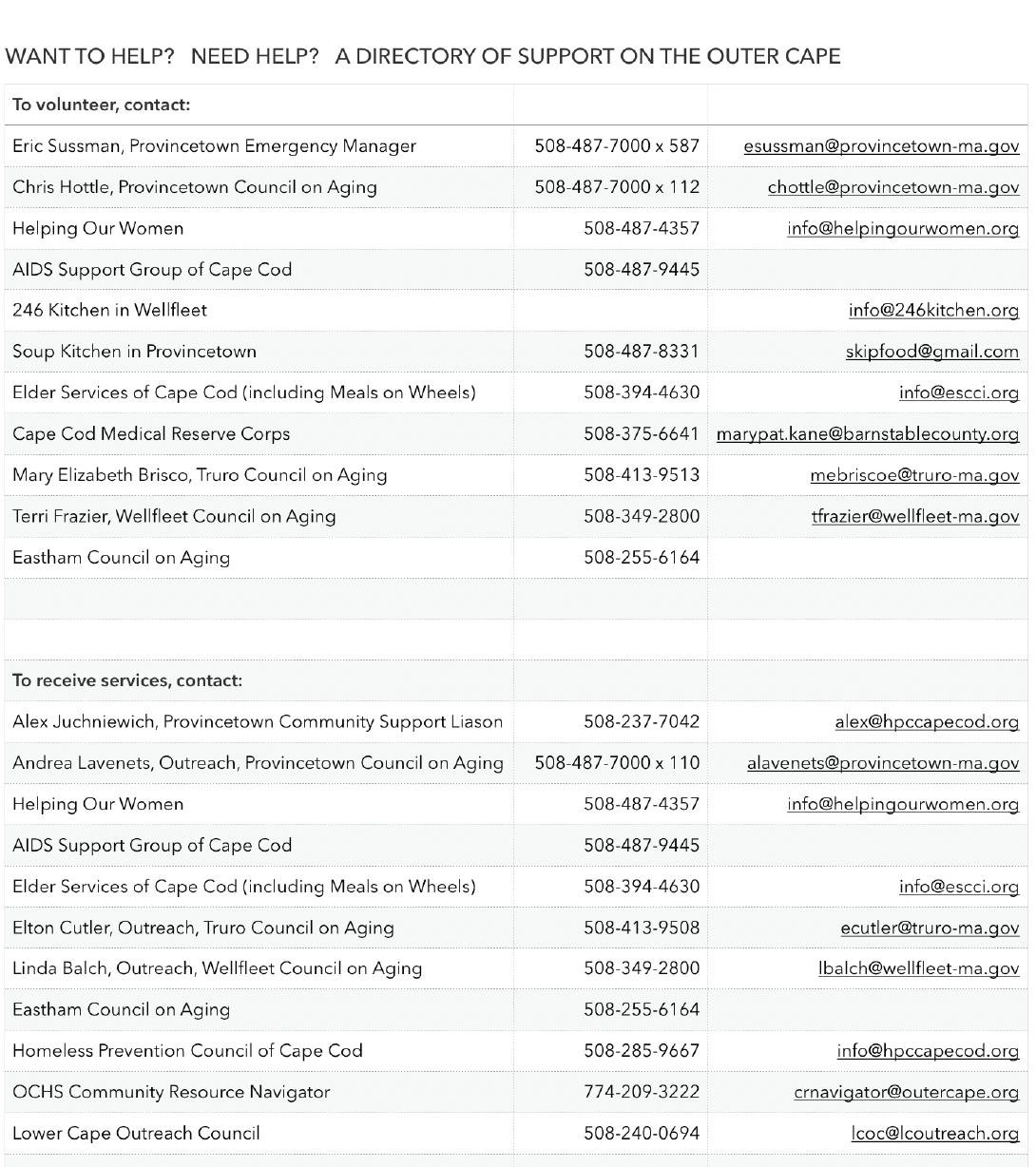PROVINCETOWN — We are in uncharted territory with the coronavirus pandemic. The problems and stresses of “social distancing” and possible quarantine are intimidating. Many of our friends and loved ones are especially vulnerable, yet it can be risky to help them. There are still ways to help, but they require thoughtfulness and judgment in order to balance risk and need.
It’s not only about serving others. Many of us want to find a constructive way to engage — to stop worrying about ourselves and focus on someone else. The healthiest thing to do right now might be to help one another.
The Independent talked to five different nonprofits and four town departments about the best ways to serve right now. They all agree that it’s all about being more careful and more conscious.
Safer Service
Coronavirus is an unusually tough problem for service organizations, especially larger ones. A core principle is that they never put volunteers or clients in danger, but with COVID-19, the danger can be hidden. The infection can be pre-symptomatic for up to 14 days, and a significant fraction of infected people never have noticeable symptoms. Both pre-symptomatic and asymptomatic people can spread the infection, which means that a volunteer who looks and feels perfectly fine can nonetheless carry the illness to a vulnerable person. This dilemma is part of the reason quarantining some people has given way to physically distancing everyone.
Organizations are retooling their workstreams to keep volunteers and care-receivers from coming into close contact. The Soup Kitchen in Provincetown has closed its dining room, trimmed down its cooking staff, separated the food preparation stations to six feet apart, and reformatted all its meals for takeout.
Helping Our Women used to let clients pick and choose in its free food and toiletries pantry; now, it takes orders over the phone, prepares grocery bags of supplies, and arranges for clients to pick them up without coming indoors. Programs that provide deliveries of groceries or hot meals are now leaving them on doorsteps. Social calls and wellness visits are being conducted over the phone. The Provincetown Council on Aging called more than a hundred of its regular clients over the weekend just to check on them.
Some of these organizations are relying on their core volunteers for now, but many are happy to bring in new people. Helping Our Women, the Provincetown Council on Aging, and the 246 Kitchen in Wellfleet all encouraged volunteers to call or to contact them through their online applications. Meals on Wheels (run by Elder Services of Cape Cod in Dennis) is seeking drivers, and Eric Sussman, Provincetown’s emergency manager, is building a list of volunteers and the kinds of labor they would like to contribute. (Sussman’s email is [email protected].) Cape Cod Medical Reserve Corps is focused on trained medical volunteers but is accepting nonmedical volunteers as well.
Doing More for Less
Some suggested that volunteering with a group doing a single organized activity — grocery shopping for the homebound, say — isn’t the only way to serve. If minimizing physical contact in order to stifle transmission of the virus is the broader goal, then picking one person in your social network and serving them in a variety of ways — shopping for groceries, hauling the trash, running to the post office, and driving them to appointments — limits the number of people to whom you and they are exposed. It means you’ve pruned a potential web of contacts down to one extra person.
Of course, there is still some risk involved for both parties. Serving one person is not the same as staying home. But if you’re going to the grocery store anyway, and picking up food for a friend or neighbor means he or she can stay home, then it’s a bit of a win for everybody.
“It’s kind of up to each one of us to say, ‘What am I comfortable with, what am I not?’ ” said Sussman. “How much risk is OK for my family? It’s not an easy question, but it’s one that people should be asking themselves.”
“I support the idea of picking a couple of neighbors or friends and checking in on them,” said Morgan Clark, Provincetown’s health director. “That’s how we’re going to build resilience as a community. I’m worried most about the people who don’t have a circle, and bringing them in.”
Resources for Those in Need
“People over 60 can call us for anything,” said Chris Hottle, director of the Provincetown Council on Aging. “No question is too big or too small. We feel really strongly that we can find out for people, even if it’s not a service we offer. We can find out who does.
“Also, we are local, and we are with people forever,” she added. “We can be with them for whatever they need.”
“For people who don’t fall into the mandate of Council on Aging or Helping Our Women or AIDS Support Group of Cape Cod, I also want people to know that the town has an outreach coordinator who covers everyone else,” said Clark. “He’s Alex Juchniewich, the community support liaison, and he can help connect anyone who is isolated or in need to whatever they need. I don’t want people to feel they have to depend on neighbors. Call Alex; he’ll coordinate.” (Juchniewich’s number is 508-237-7042.) Clark added that all of these services serve everyone regardless of citizenship or immigration status.
This is a strange time on the Outer Cape. And it might become stranger and scarier. Taking care of each other — in thoughtful, sensible ways — may be one of our best chances to handle the disorientation and fear.



